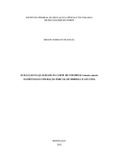Avaliação da qualidade da carne de Codornas Coturnix Coturnix alimentadas com ração parcial de moringa e leucena

Visualizar/
Data
2023-03-31Autor
Souza, Erison Derkian de
http://lattes.cnpq.br/7292676647859387
http://lattes.cnpq.br/6296819107382165
Metadado
Mostrar registro completoResumo
Currently the aviculture is consuming a significant seat in Brazilian agribusiness, supported
by high technologies and investments in the area, bringing to the supporters new genetic and
nutritional measures to acquire a qualitative advance for the sector. Alternative foods seek to
improve the viability of production, contain costs, and assist in the nutritional needs of
animals, contributing to productive performance and increase in production efficiency and
competitiveness of the system. Among the characteristics mentioned are in northeastern Brazil
the leucena leucocephala Leucaena and moringa Moringa oleifera, two legumes adapted to
the semiarid region with possibilities of adhering in the feeding of the whims. They are very
productive, with considerable chemical values, showing potentialities in protein contents,
minerals, and vitamins, in addition to other qualities as a dietary supplement, highlighting
them. The quality of coturnix coturnix bean meat fed with partial moringa and leucena feed
was evaluated. The experiment was carried out in the Poultry Sector of IFRN/Campus
Ipanguaçu, using 120 mixed codors of the species Coturnix Coturnix maintained in
conventional shed and distributed in a completely randomized design, with 4 treatments and 5
replicates of 6 birds each. The experimental diets containing moringa and leucena were
formulated based on corn and soybean meal, with the inclusion of flour from moringa and/or
leucena leaves, in the proportion of 7% inclusion, being: Control (0% moringa + 0% leucena),
FFMO (7% moringa + 0% leucena), FFLE (0% moringa + 7% leucena); and FFMO + FFLE
(3.5% moringa + 3.5% leucena), formulated according to recommendations of nutritional
requirements of the species. Carcass weight parameters (g/bird) were evaluated; carcass yield
(%); shear force (kgf/cm2); ph; weight loss in cooking (%); brightness and color. The
cordidfeds fed partial moringa and leucena flour in the diet did not have significant effect with
the established percentages capable of changing the parameters analyzed for meat quality.
Treatments containing the inclusion of leucena leaf flour - FFLE; and/or FFMO + FFLE -
were predominantly higher in most analyses, highlighting further research for the availability
of this plant in the feeding of the whims. The results obtained provide a positive factor: the
implementation of flours aiming at a reduction in feed costs, assisting in the income of
producers, since these results do not compromise the nutritional and commercial availability
offered by the creation of this species.



